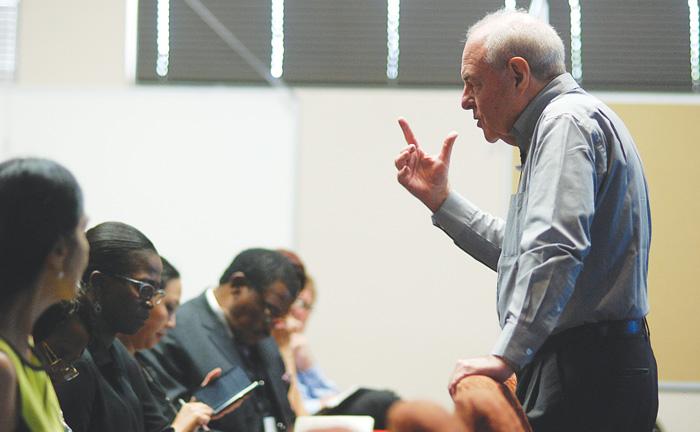
Mervyn King on sustainable business

Mervyn King, the “King on Governance” explained to a captivated audience his life’s work on Governance, Strategy and Sustainability in one breath; “Value is no longer based on the financial performance of a company as you can not direct a company without embedding sustainability issues into the strategy.”
Hosted by the Pupkewitz Foundation at the Namibia Institute of Public Administration (NIPAM) in Windhoek earlier this month, the renowned South African corporate attorney, arbitrator, mediator, corporate director, author and former judge of the Supreme Court of South Africa, believes that every single individual is part of a flat, borderless, electronic world. “What happens in the world impacts us, what we do impacts the world” he encapsulated his overarching theme.
“Transparency does not need to mean nakedness when communicating to stakeholders on what is happening in a company.” This he said while posing the question. “Does your company have a Chief Stakeholder Relations Officer?”
“Leaders in business and governance need to use international standards or methods to guide the measurement of business impact or what is also called the tripple bottom line of people, planet and profit” he added.
The author of the world acclaimed King II Report issued in 2002 said; “Doing business today is quite different from the past. Different corporate tools are needed and one of the four corporate tools for today’s business is integrated thinking.
This, he said, extends to strategy and daily management beyond the pure financials to encompass social and environmental factors that deeply affect a company’s future viability in the 21st century as integrated thinking leads to another tool – the integrated report.
If adopted into State Owned Enterprises, emphasising that governance in these institutions is not static, he said integrated reporting and integrated thinking add value.
He said directors need to ask, what is the purpose of the business of this company and what are its three value drivers that hinge on character and reliability.
“There is an energetic activism amongst stakeholders, like never before and top graduates turn down jobs at top companies who are doing “business as usual,” they prefer “business as unusual”.
Drawing the circle wider, he said civil society will no longer accept the company that has made profits through adverse impact on human rights. Thanks to pension funds, the individual has become the owner, employee, financier, manager, director, end-user. “The shareholder of the company is no longer wealthy families.”
“The purpose of the company is not detached from the reality of the world, as the purpose of the informed strategy is key to transparency and accountability.”
King said that merely sitting down with the partners in a business or government boards and asking the question, at times on a continuous basis, who the five major stakeholders are, he said, adds incremental value. Businesses, large and small, have the same issues to contend with: greater expectations of their stakeholders, rising consumer power in the digital information age, environmental constraints, economic uncertainty in the aftermath of the global financial crisis, and social uncertainty on rising income inequality. He is regarded as being ahead of his time in adopting an integrated and inclusive approach to the business life of companies, embracing stakeholders other than shareholders. Prof. King consults and advises on corporate legal issues as he is recognised internationally as an expert on corporate governance and sustainability.










































